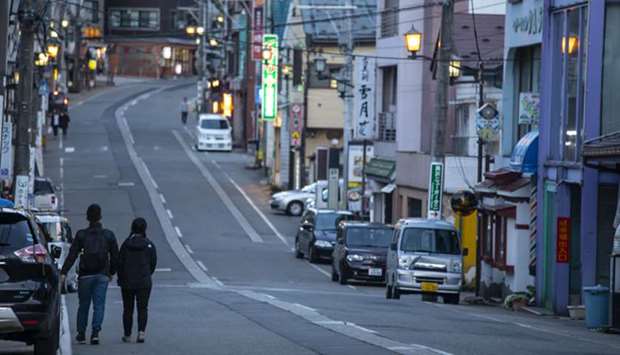Japan yesterday extended its state of emergency in Tokyo and other regions and announced new measures covering seven more prefectures to counter a spike in Covid-19 infections that is threatening the medical system.
The current state of emergency, the fifth of the pandemic so far, was due to expire on August 31 but will now last until September 12.
Tokyo announced 4,377 new coronavirus cases yesterday, after a record 5,773 on Friday.
“The Delta variant raging across the world is causing unprecedented cases in our country,” Prime Minister Yoshihide Suga said. “Serious cases are increasing rapidly and severely burdening the medical system, particularly in the capital region.”
The emergency will now cover nearly 60% of Japan’s population with the prefectures of Ibaraki, Tochigi, Gunma, Shizuoka, Kyoto, Hyogo and Fukuoka included.
Less strict “quasi-emergency” measures will be applied to a further 10 prefectures.
Restaurants are being asked to close early and stop serving alcohol in exchange for a subsidy.
Suga announced a fresh subsidy of 300bn yen ($2.7bn) to help businesses cope with the fall-out.
Suga said the government would also request occupancy limits at department stores and ask people to reduce by half the times they go to crowded areas.
Speaking at a news conference explaining the steps, the government’s top health advisor, Shigeru Omi, said Japan needed to come up with steps to “prod individuals to avoid taking action that could potentially spread infections”.
He said that could be done under the current laws, which are mostly based on voluntary co-operation, but added that there’s also room for a nationwide debate on how to do this under a new legal framework. He did not go into details.
Speaking beside Omi, Suga said the government would consider crafting legislation to swiftly prepare enough hospital beds for critically ill Covid-19 patients, and speed up vaccinations.
Suga dismissed the idea of imposing a blanket, nationwide state of emergency, saying that would pose “excessive restrictions for some prefectures” that were succeeding in containing new infections.
Japanese shares fell for a fourth day yesterday as concerns about the Delta variant overshadowed optimism about upbeat earnings.
Japan’s case fatality rate stands at about 1.3%, compared with 1.7% in the US and 2.1% in Britain.

(File photo) Tokyo announced 4,377 new coronavirus cases on Wednesday. The emergency will now cover nearly 60% of Japan’s population with the prefectures of Ibaraki, Tochigi, Gunma, Shizuoka, Kyoto, Hyogo and Fukuoka included.
